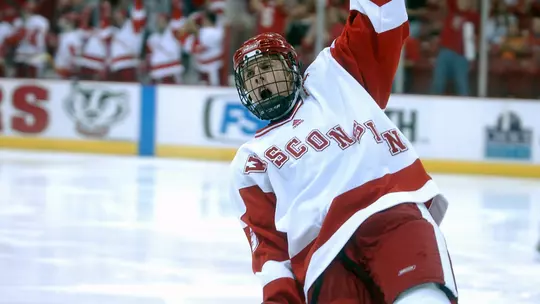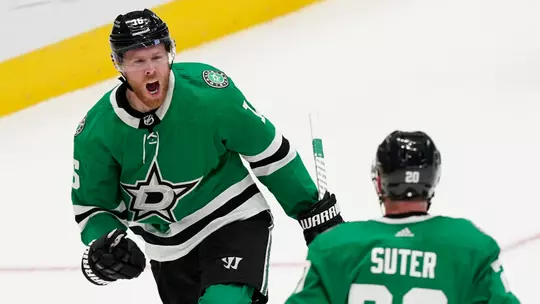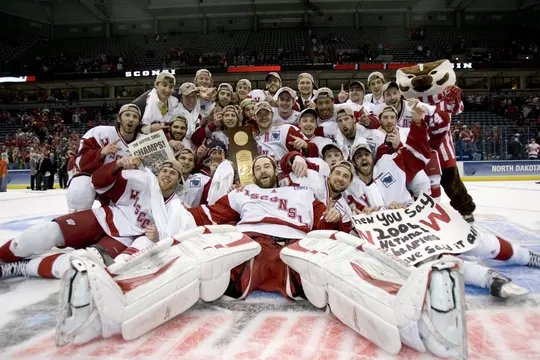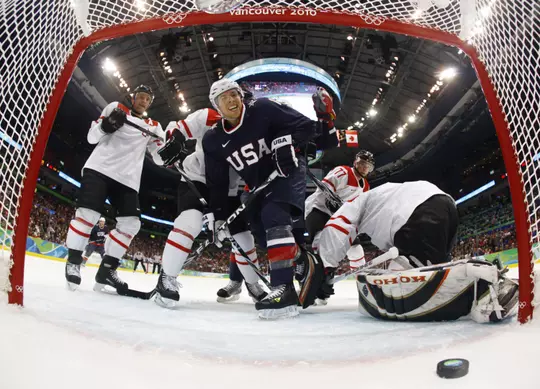
Wisconsin's Winner: Joe Pavelski Night
Success follows Plover, Wisconsin's Pavelski everywhere he goes
12/6/2024
BY ANDY BAGGOT
UWBadgers.com Insider
There are so many cool details embedded in Joe Pavelski’s hockey resume that one could be excused for not noticing what might be the most endearing one of all.
Pavelski is inarguably the greatest player born and raised in Wisconsin (he was born in Stevens Point; Mark Johnson was born in Minneapolis) and arguably the most prolific performer to play for the Badgers, win an Olympic medal and reach the NHL (Johnson and Hall of Famer Chris Chelios are prominently in that mix).
In 18 pro seasons, Pavelski scored more NHL goals (476) than any other former Wisconsin player, making him the 10th American-born skater in NHL history to reach 400 goals. He also owns the record for most Stanley Cup playoff goals by a player born in the U.S. with 74, including 18 game-winners.
In 1,332 career games, Pavelski emerged as the fifth player in NHL history – and the only American – to be drafted in the seventh round or later and to amass 1,000 career points, joining Theo Fleury, Doug Gilmour, Luc Robitaille and Dave Taylor, who are all Canadians, although Robitaille has dual citizenship. Pavelski, who totaled 1,068 points, was chosen with the eighth pick in the seventh round, 205th overall, in the 2003 NHL draft by the San Jose Sharks.

There are more biographical tidbits regarding Pavelski’s career to be sure – Example: Can you guess who scored the winning goal and assisted on the clincher as Stevens Point toppled Superior 2-0 to win the WIAA state title in 2002? – but you probably won’t find one that defines his commitment to excellence and the game of hockey quite like this:
Going back to his high school time at SPASH, then to his junior days at Waterloo (Iowa) of the U.S. Hockey League, then to college with the Badgers, then to the pros with Worcester of the American Hockey League, the Sharks and the Dallas Stars of the NHL, Pavelski never experienced a losing season.
“That’s truly amazing,’’ said former UW coach Mike Eaves, who helped recruit Pavelski to Madison and watched him guide the Badgers to their sixth NCAA title in program history in 2006.
“That’s a pretty incredible stat,’’ said Dany Heatley, a former UW standout, NHL first-round pick and a San Jose teammate of Pavelski.
“Maybe that’s why he was always excited and happy and pumped up to be at the rink,’’ said former Wisconsin and NHL teammate Adam Burish, who captained that ’06 national championship squad.

“I was on a ton of good teams, did a lot of winning,’’ Pavelski explained. “You were around players with pretty high standards. You learn really quick how to fit into that and to grow and what to expect.’’
“Every day there was something.’’
Heatley, who played for Wisconsin from 1999 to ’01 and teamed with Pavelski in San Jose from 2009 to ’11, had a similar experience as Burish. Heatley was asked what stood out about Pavelski.
“Number one, just his work ethic, how dedicated he was to being a better player,’’ Heatley said. “He’s obviously one of the best at tipping pucks probably ever to play the game. That’s not by accident. He was always out there early before practice. He was always out there late, too. A real craftsman on the skills, if you will, and a real high hockey IQ.’’
This from a guy who was the second overall pick of the Atlanta Thrashers in the 2000 NHL draft and won the Calder Trophy as the top rookie in 2002.
He had some pretty nice tools in his tool box that helped him make that step. A lot of times, you can be a really good college player or junior player and not have that next gear that you need at the next level. Joe found that gear.Former UW Head Coach Mike Eaves
“Everywhere he goes,’’ Eaves said of Pavelski, “he makes people better around him.’’
Pavelski turned pro after his sophomore season, a move that caught a lot of college hockey observers by surprise. He wound up playing just 16 games in the AHL – totaling eights goals, 18 assists and 26 points – before he was called up by San Jose for good.
“For selfish reasons I wanted him to stay,’’ Eaves said. “As great a year as Joe had, he was going to have to make a step to get to make it to the next level.
“Joe’s pretty pragmatic. He looks at what needs to be done. He sets the work that needs to do in front of him and he gets after it. He’s got that resolve that helps him get it done.
“He had some pretty nice tools in his tool box that helped him make that step. A lot of times, you can be a really good college player or junior player and not have that next gear that you need at the next level. Joe found that gear.
“He was labeled as not overly big, not overly fast, good shot, good hands, good IQ. He always played to his strengths and that’s what he built his game on.’’
Burish said his friend and former UW linemate was driven by all those perceived slights.
“He always had a chip on his shoulder because everyone told him he wasn’t fast enough, he wasn’t big enough, he wasn’t strong enough,’’ Burish said. “So, he prepared with that chip on his shoulder, he practiced with that chip on his shoulder, he played with that chip on his shoulder and everyday he wanted to prove people wrong and he wanted to get better.
“When you have that attitude and you’re happy to come to work every day – you’re happy to be at the rink, you’re to practice, you’re happy to workout, you’re happy to train – you shouldn’t be surprised when you have success.’’
Pavelski was the same way in the pros.
“I don’t ever remember a coach jumping on Pavs, yelling at him,’’ Burish said. “He was always on.
“If you’re a coach – I have no idea what goes on in a coaches’ mind – I have to imagine that he’s a coach’s dream.’’

Pavelski said his No. 1 priority nowadays is “being home and being around the family and being able to help coach (14-year-old son) Nate and his team.’’
Nate Pavelski plays for the Madison Capitols Triple AAA 14-and-under club. Luke Stauffacher, a good friend of Joe Pavelski, coaches the team.
“He’s 14 now,’’ Joe said of Nate. “It happens quick.’’
Pavelski said he felt his game was still at a high level and that he was 100 percent engaged. He said he could have played for another year or two. Why retire then?
“I had a great ride,’’ he said. “I had no regrets. I had success right to the end, it felt like.
“I don’t have a great answer. It was more of a feeling than anything else.’’
Heatley said he wasn’t surprised by the fact that Pavelski never experienced a losing season,
“Good players, good humans, do good things,’’ Heatley said. “As a body of work, it’s not coincidental.’’
























